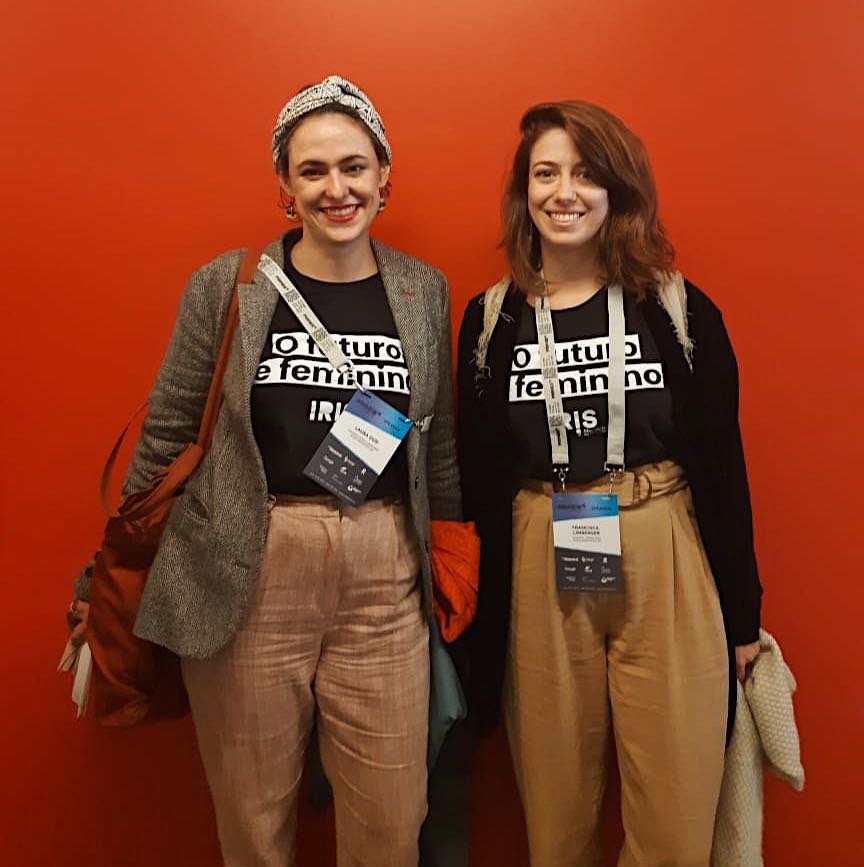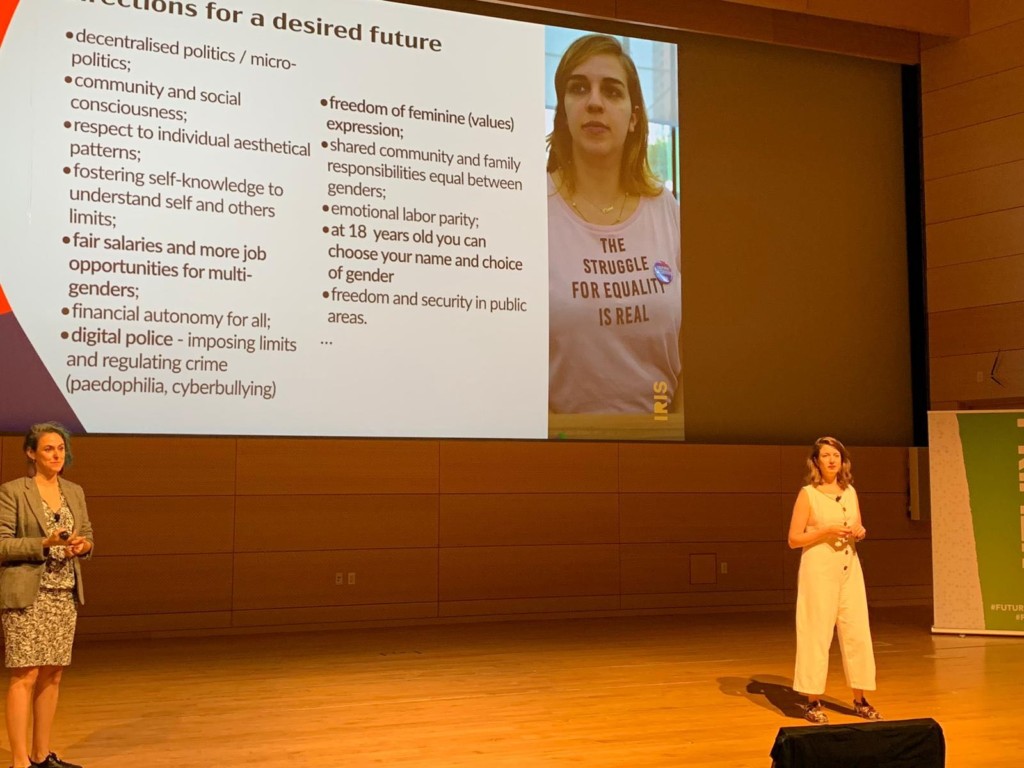Primer Conference is an annual event hosted by the Design Futures Initiative, a nonprofit organisation based in San Francisco, CA. The event was created to gather people from around the world to speculate futures; they also have an annual gathering for the Speculative Futures community to get together, with meeting points all around the globe (Australia is one of them; Melbourne to be precise. Click here to find out more).
Echos’ Strategic Design Lead, Francisca Limberger, and Echo’s Senior Consultant, Laura Dusi attended Primer19 to speak about Project IRIS, a social innovation initiative founded by Limberger and Echos co-founder, Juliana Proserpio, that aims to build a desirable future in which gender equality and female freedom are realities.
Francisca is a strategic designer and facilitator in innovation projects. Passionate about the improvement of organisations and society through design, she believes learning and consultant projects walk together to increase the positive impact of the innovative solutions in complex environments. I sat with her to discuss her experience at Primer19, the future of female freedom and the power design has in building desirable futures.
Laura Dusi (left), Francisca Limberger (right).
RG- Francisca, first things first. How would you describe yourself?
FL- I am a calm, really curious person; especially when it comes to people, places and food. I love cooking, wine and Brazilian carnival. I am originally from Porto Alegre, in the South of Brazil, but have lived in Sao Paulo for almost seven years.
RG- You are the Strategic Design Lead at Echos Brazil. What does your job entail?
FL- As a Project Lead, I am the main point of contact with the client. I am responsible for giving support to the team, and make sure they stick to the project schedule. I am also one of the creators of Echos’ Designing Desirable Futures methodology and course. I’m still involved in the course.
RG- Could you describe what Project IRIS, and how did it come to exist?
FL- Project IRIS is a design project based in Brazil, that aims to extinguish gender inequality by 2030. In order to achieve this goal, we have ten ambassadors who represent and are based in the five main regions of Brazil. The project has three phases. In the first phase, we build Brazil’s Future Map of Feminine Freedom. In the second phase, we create solutions – what we call “minimal viable future”, or MVF. In the third phase, we accelerate the solutions. IRIS emerged as a part of another Echos’ project, called “Deep Empathy – Violence against Women”. In that project, we had been using the Designing Futures methodology since 2017. As time went by, the project took shape and officially became IRIS. By 2018, we selected the ambassadors and volunteers; the project became bigger and Echos – although still our biggest supporter – is no longer our home. As IRIS’ co-founders, Juliana and I are still leading the project with the help of incredible volunteers, such as Laura.
RG- Speaking of Laura, last month the two of you were guest speakers at Primer19, in New York City. Talk me through this year’s theme “Futures For All”.
FL- Primer aims for diverse and inclusive futures initiatives, hence the tagline “Futures For All”; and they didn’t disappoint. We have this social project aimed at Brazil, but there were projects from all over. There was a project from India, for example, called “Decolonizing Future” about inclusive storytelling. There was also Paola Antonelli who talked us through her latest work “Broken Nature in Triennale Di Milano”.
Laura Dusi (left), Francisca Limberger (right) during their talk at Primer19.
RG- The theme of your talk was “IRIS – Freedom of The Feminine”. What did you cover?
FL- We explained the concept of Project IRIS and how we managed to do it. We gave the crowd some Brazilian contextualization about gender and general politics and shared the results we have so far – the Future Map and how the project ambassadors are becoming leaders in their regions.
—
“Design is solution-oriented but in a very human way. We have to think, research and create solutions that are good for women, but they cannot be bad for everyone else.”
—
RG- Foresight and human-centred design are a powerful combination when we think of creating change in society. How does Design Thinking apply to this process of creating a future that is safe for women and guarantees feminine freedom?
FL- Design is solution-oriented but in a very human way. We have to think, research and create solutions that are good for women, but they cannot be bad for everyone else. Design makes us think about society and brings together everyone who is part of the problem. The process also helps us focus and start from a specific problem, which helps avoid freezing when facing many wicked problems.
RG- In your opinion, what is the biggest challenge we face today when it comes to turning female freedom into a reality?
FL- Oh God, there are so many! But I would risk saying that we have to get men involved, otherwise is a war we are fighting alone.
RG- What would the most effective way to do that?
FL- Design! By using the Designing Desirable Futures methodology, we are able to get everyone together, regardless of gender. In the course, we offer a safe space where people can be vulnerable, and in doing so, we achieve a different kind of connection which allows discussions that truly challenge ourselves in co-creating futures that work better for everyone, not just yourself.
RG- You are a seasoned Design Thinker with a vast resume in innovation projects. What pearls of wisdom would you share with someone who is starting their innovation journey through Design Thinking?
FL- Stay curious, never stop asking questions.
RG- Any thoughts about the future?
FL- Speaking at Primer19 gave me the chance to see that we are in a growing and very engaged community of future designers. Although the process is challenging, it’s nice to know we are not alone.
RG- I always like to end my interviews by asking the person whom I’m speaking with to share a quote that inspires them. Do you have one to share?
FL- I’ll quote Lithuanian futurist Monika Bielskyte, who says “Who owns our dreams owns the future”.
RG- We better keep on dreaming, then. Thank you, Francisca!
FL- Thank you!
—
To learn more about Echos’ Designing Desirable Futures course, click here.
You can watch Francisca and Laura’s full talk at Primer19 below:
PRIMER19 – Laura Dusi & Francisca Limberger: IRIS – Freedom of the Feminine from Design Futures Initiative on Vimeo.
—
Follow us on social
Instagram – Facebook – LinkedIn – Youtube
How Can We Help?
- For training and Innovation Journeys in your company: check out our in-house course offering.
- For upcoming courses in your region: visit our website.
- For upcoming events in your region: look at our event calendar.
- If you have a special project and would like to use Echos’ consultancy services: send us an email.
- Want to speak to a real person? Call us on 1300 502 006




